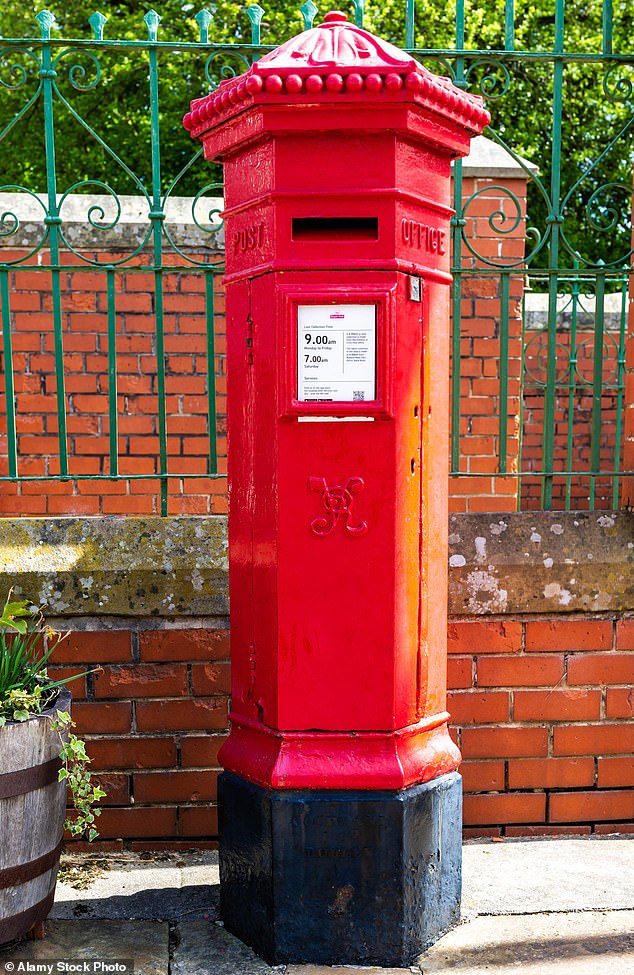The familiar red, Royal Mail pillar box at the corner of my street on the fringes of Richmond Park in South-West London features the cypher of Edward VII.
Across the country there are still postboxes from Queen Victoria’s reign, which carry the letters VR — which stands for Victoria Regina. Regina meaning queen in Latin.
Our postboxes are living memorials to the kings and queens of Great Britain who followed her — some 130 are marked with the cypher of Edward VIII, despite his short reign before his abdication. More than two thirds of them carry EIIR, for the late Queen Elizabeth.
In short, there can be few commercial institutions in the UK which are so redolent of our national history — and none at all that can trace their origins back to the moment in 1516, when Henry VIII knighted the first Master of the Posts, Sir Brian Tuke, who created the first formal postal network.
Daniel Kretinsky, right, at last year’s Europa Conference League final, which was won by West Ham, a club in which he owns a large stake

In the manner of other billionaires Kretinsky has an heiress girlfriend, 27-year-old fellow Czech Anna Kellnerova
Yet 508 years on, Royal Mail, one of the nation’s most venerable institutions, has never seemed more imperilled.
It is within weeks of being sold to a mysterious billionaire from Eastern Europe, Daniel Kretinsky, who cashes in on ‘dying industries’ — and is so enigmatic he is known as the Czech Sphinx. A man with an estimated worth of £6 billion, underpinned by investments in fossil fuels — which is why they also call him the Fossil Hyena, a soubriquet that is fully justified.
Royal Mail’s parent company, International Distribution Services (IDS), has accepted a £3.6 billion offer from Kretinsky. If shareholders approve and he takes over, the firm will no longer be listed on the London Stock Exchange as it has been since its 2013 privatisation.
The hugely important company with a historical pedigree second to none will be taken private by a ruthless foreign owner and allowed to operate with a scandalous lack of scrutiny. Kretinsky, 48, has invested in trophy assets in Western Europe and, by doing so, adopted a veneer of respectability. In addition to the 27.5 per cent stake he has already acquired in IDS, he owns sizeable chunks of retail giant Sainsbury’s, French supermarket chain Casino and Elle magazine in Paris.
In the manner of other billionaires he has an heiress girlfriend, 27-year-old fellow Czech Anna Kellnerova. A champion showjumper, she is the daughter of the late Petr Kellner, who was the Czech Republic’s richest man until he died in a helicopter crash in 2021, aged 56.
Kretinsky’s enthusiasm for the beautiful game has led him to acquire the Czech football club Sparta Prague and a large stake in West Ham — both of which played last season in top-tier European competitions. He has a personal taste for luxury, too, owning a sumptuous Paris mansion and a £65 million residence in London.
Nothing wrong in any of that. But as to the Royal Mail takeover, I believe there has been a shocking lack of concern expressed by the authorities about Kretinsky’s labyrinthine commercial empire and some business associates.
The Czech Sphinx is among a group of oligarchs who recognised the value of ‘dirty energy’ industries, such as oil, coal and chemical utilities, that are set for long-term decline because of the headlong rush to reduce carbon emissions. He is an opportunist who sees potential which others often overlook.
He said in a 2015 speech: ‘We want to make money in industries that are dying because we think they’ll die much more slowly than the general consensus says.’
His deep pockets are not just the result of his own work. As we shall see, his huge wealth was acquired with the assistance of business partners who have been involved in unsavoury legal disputes in the UK overseas territory of the Turks and Caicos Islands and the New York courts.
Given his reputation as a scavenger, you would have thought the Royal Mail takeover would have featured prominently in the General Election campaign, with each party pledging to save a national asset from being sold off.
Yet there has been silence on this wretched affair, although Labour did finally mention it in its manifesto this week, with a promise of scrutiny of the deal and a plan to explore other forms of ownership.
The importance of Royal Mail to Britain, to our economy and the public interest, cannot be overstated.
It must, through the Universal Service Obligation, provide letter and parcel deliveries six days a week to every address in the UK, whether down remote country lanes, or on rundown estates beset by gangs and violence.
The company is vital to all public services and local authorities and every business in the land. And this week Royal Mail is ensuring the safe delivery of ballot papers to those who have chosen to use postal votes in the election.
It is easy to take for granted the vast workforce of 150,000 people and the complex logistics which mean most of the time more than 90 per cent of first-class deliveries arrive the next day.
The postie, out in all weathers, often in shorts, is for many elderly and lonely people a regular contact point with the outside world. While most of us were sheltering in our homes during the pandemic, postal workers were among those who helped keep Britain and the economy ticking over.
The fact that ‘Postman Pat’, or ‘Patricia’, and the values they stand for, are being put at risk by the likelihood of a rapacious overseas owner with — as I will explain — questionable business connections is unconscionable. It is inexplicable that political leaders have so far declined to intervene.
The National Security and Investment Act of 2021 was designed precisely to investigate and, if necessary, block the sale of critical British enterprises overseas.
But it has so far been toothless in the face of foreign takeovers which undermine Britain’s prosperity and allow dividends, earnings and world-leading technologies to flow abroad.
The Tories, with their belief in the laissez-faire free market economy, are always reluctant to take a stand against takeovers. This has resulted in catastrophic mistakes.
Theresa May and her chancellor, Philip Hammond, oversaw the sale of Cambridge-based ARM Holdings for £25 billion to Japan’s Softbank in 2016 in a bid to show Britain was still open for business after the Brexit vote. Not only did it deprive our country of a semiconductor and software pioneer built on the genius of one of our great research universities, it also saw capital value and intellectual property flow overseas.
ARM is now riding the AI revolution and is valued at more than £100 billion in New York, while its senior management and many technicians have vanished across the Atlantic.
Labour is no better, arguing that the policing of takeovers is a matter for regulators. Until its manifesto launch, the party had been largely silent about Royal Mail in spite of strong opposition to the deal from its Communications Workers Union (CWU) paymasters.
W riting in the Daily Mail this week, the union’s general secretary, Dave Ward, described what has happened to Royal Mail since privatisation as ‘one of the biggest scandals of recent times. Hundreds of millions of pounds which used to go to the Treasury now go into the pockets of mainly rich shareholders often offshore’.
He accused the board of having ‘ripened’ the postal service for a bid by the Czech billionaire.
In order to buy IDS, analysts say Kretinsky and his partners will need to raise up to £3 billion in loans from international banks. This, together with the £2 billion or so of debt already on Royal Mail’s balance sheet, would mean a catastrophic interest rate bill. It could only be paid for by disposing of assets such as Royal Mail’s property portfolio, which is worth about £1.4 billion.

Across the country there are still postboxes from Queen Victoria ’s reign, which carry the letters VR — which stands for Victoria Regina. Regina meaning queen in Latin
The company still sorts letters in a large freehold complex at Mount Pleasant in Central London, a prime site in one of the capital’s trendiest areas. Kretinsky might well think it could be sold and turned into luxury flats.
Then there’s the company’s fast- growing and profitable European Global Logistics Services (GLS), based in Amsterdam, described as the jewel in Royal Mail’s crown. That could be sold off, too.
Kretinsky’s camp insists he does not want to break up the business, and will keep the six-day-a-week delivery obligation.
But he has already said he will put up stamp prices and the record of some of his associates does not inspire confidence. An excoriating investigation by The Guardian newspaper casts a harsh light on the business connections of the Czech tycoon.
The son of a computing professor and a senior judge, Kretinsky began his financial career as lawyer to investment company J&T Finance Group.
J&T was founded in 1993 in Slovakia, the year the country became independent following the 1989 Velvet Revolution, which led to the end of communism there.
It was set up by two of his former school friends — Patrik Tkac and Ivan Jacabovic — and, according to the Slovak Spectator newspaper in 2008, ‘they had relatively easy access to capital and contacts, as Tkac’s father Jozef was head of the IRB state bank’.
Kretinsky was the details man and became a full equity partner of J&T in 2009, when the firm split out its energy and industrial assets into a separate company. (After the fall of the Soviet Union and the end of communist rule in Eastern Europe there had been a capitalist free-for-all, which saw oligarchs across the region engaged in a mad grab for such assets.)
More than a decade later, he is the figurehead of a £43 billion empire. His EP Group, which is bidding for Royal Mail, is part of a mammoth business empire based around seven holding companies that own stakes in energy, logistics, sports and retail businesses.
And all those holding companies are at least 44 per cent owned by ‘J&T related investors inc P Tkac’, according to a chart supplied to The Guardian by the billionaire’s advisers.
This is the same J&T that has been at the centre of an alleged property corruption scandal in the Turks and Caicos Islands, a dispute not fully resolved, although the company claimed it had identified ‘no wrongdoing’ in its actions. And the same J&T that was named as a defendant in New York court papers in 2019 which alleged that another Czech billionaire, Radovan Vitek, had been involved in a ‘massive scheme to defraud business partners’.
(The case was never heard in New York after a judge ruled it was the wrong jurisdiction.)
Similar cases have been filed in Cyprus and Luxembourg, although Vitek disputes the validity of lawsuits, saying they are ‘based on false allegations’.
Meanwhile, activist investor Muddy Waters Research, which specialises in exposing the flaws in public companies, raised questions in a report in January about J&T’s alleged involvement in a controversial property deal in the Czech Republic.

A champion showjumper, Ms Kellnerova is the daughter of the late Petr Kellner, who was the Czech Republic’s richest man until he died in a helicopter crash in 2021, aged 56

It is disgraceful that our politicians simply sit on their hands while get-rich-quick Czech interests seek to plunder Royal Mail, writes Alex Brummer
J&T may, of course, be entirely innocent. But details of the myriad investigations involving Kretinsky’s partners, as well as those of any unresolved legal issues, should at least be fully disclosed when formal offer documents by Kretinsky’s EP Group for the purchase of IDS are issued.
A statement from Kretinsky’s team has pointed out that it has already received clearances for its dealings from the relevant UK authorities — but the fact is no one can be sure how thorough their checks on Kretinsky and his associates have been.
Such probes generally focus on national security rather than the impact on consumers of financially driven foreign deals. It would be a gross dereliction of duty if the authorities do not insist on much tougher scrutiny.
There is no doubt that Royal Mail is going through a difficult time as email and other online communications erode the volume of letters we send.
The Royal Mail network is designed to process 20 billion letters a day, yet numbers have dropped to seven billion and estimates suggest that they will go down to four billion in the next few years.
But whatever the rights and wrongs of how best to maintain, restore and improve Royal Mail, it is vital that the next government puts a stop to this sale.
The crisis at Thames Water illustrates what happens when foreign owners siphon off billions of pounds overseas in dividends and interest payments through complex ownership structures. Thames now stands on the brink of being taken into special receivership by the Government, having racked up a mountain of debt amid regulatory action against the firm over sewage discharges.
It is disgraceful that our politicians simply sit on their hands while get-rich-quick Czech interests seek to plunder Royal Mail.
The timetable for Kretinsky’s bid runs almost parallel with the election campaign. It cannot be allowed to slip through the net while their attention is elsewhere.
The great paradox is that in recent weeks Royal Mail has issued the first new stamps carrying the King’s profile.
A change of ownership to that of a foreign billionaire would make a mockery of the ‘Royal’ in the company’s title — and be an insult to the monarch himself.
Some links in this article may be affiliate links. If you click on them we may earn a small commission. That helps us fund This Is Money, and keep it free to use. We do not write articles to promote products. We do not allow any commercial relationship to affect our editorial independence.

